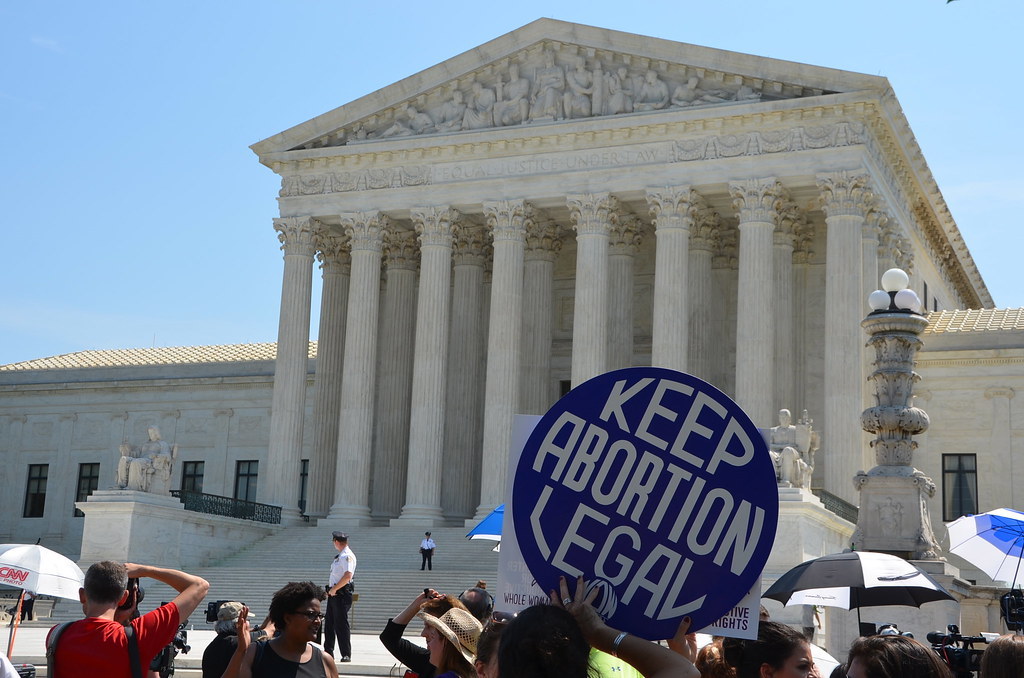Immigrant Women After Roe: A Case For Protective Laws

In June 2022, the United States Supreme Court made a landmark decision overturning Roe v. Wade and giving the right to determine abortion’s legality back to the states. In the year since the decision, 24 states have issued laws banning or severely limiting access to abortion — and it’s no coincidence that states with the most immigrants and migrants passing through their borders, like Texas and Florida, now have the harshest laws in the country.
According to data collected by the Guttmacher Institute, from 2008 to 2014, 16 percent of all women seeking abortions were immigrants. The criminalization of abortion disproportionately harms immigrant women’s access to abortion in multiple ways; one way is their restricted ability to cross state borders. According to a 2022 ABC News article, one immigrant woman in Texas was trapped in an unwanted pregnancy because her immigration case prevented her from traveling more than 70 miles, which she needed to do to obtain an abortion.
The stakes of crossing state lines and breaking the law are also generally much higher for undocumented immigrant women than their native counterparts because they could face deportation. Many immigrants’ green card status depends on following local law, and those without green card status may not be able to risk crossing state lines to access safe and legal abortion.
Criminalizing abortion also increases pregnant immigrants’ chances of arrest for common pregnancy complications such as miscarriage. There is already a bias against women of color regarding pregnancy-related crimes in the United States: A 2013 review of all women arrested for pregnancy-related crimes found that those arrested and charged were disproportionately Black women and Latina immigrants. This highlights the systemic bias and discrimination that these women face and the urgent need for policies and practices that protect the health and rights of all pregnant individuals, regardless of their immigration status or race.
The current political climate and anti-immigrant sentiment in many parts of the United States have created a climate of fear and uncertainty for pregnant immigrants seeking medical care. This fear is compounded by the fact that many pregnant immigrants may be unaware of their rights to health care and may fear seeking care due to concerns about deportation or other legal consequences. The legal and medical jargon surrounding reproductive health care can be challenging to understand — even for native English speakers, let alone those for whom English is a second language. Many people with limited English proficiency may also be unaware of the details or status of anti-abortion laws because of the lack of information and resources available in languages other than English. This limited availability of information can create confusion and uncertainty for individuals seeking reproductive health care services, including abortion care, and can result in the misinterpretation of important legal and medical information. It can also contribute to delays in seeking health care services, resulting in more complicated health issues and ultimately negatively impacting the health outcomes of immigrants. The failure to provide accurate and comprehensive information in multiple languages is a violation of the right to access health care and is a form of discrimination.
This treatment of pregnant immigrants — not to mention many pregnant citizens in the United States more generally — flies in the face of the global community’s affirmation that everyone has a right to privacy and physical health care. As outlined in the International Covenant on Civil and Political Rights (ICCPR), women are entitled to privacy, quality health care, and freedom from cruelty. Family planning and abortion are health care, and banning them denies pregnant people access to their basic human rights and safety. ICCPR also recognizes the right to freedom from cruel, inhumane, or degrading treatment. Forcing someone to carry an unwanted pregnancy to term can be seen as cruel, inhumane, or degrading treatment, especially if the pregnancy resulted from rape or incest.
Abortion is a human right, and the federal government must affirm that it will not charge or deport undocumented women caught crossing state lines in search of an abortion. President Biden must affirm that Immigration and Customs Enforcement will allow women seeking abortions to travel freely and without fear. We cannot change the current state of abortion laws, but we must ensure that fear of deportation does not trap women in unwanted pregnancies. Women awaiting immigration hearings must be allowed to travel freely to other states to obtain an abortion. Women detained in federal detention centers in banned states seeking an abortion must be transported across state lines. Immigrants must not be deported for obtaining illegal abortions or traveling to access an abortion.
The federal government must send a clear message to the states: The Supreme Court may have empowered you to outlaw abortion, but we will be doing everything in our power to protect those who are the most vulnerable. Abortion is health care. Abortion is a human right. We must take all necessary steps to protect this right for all people but especially immigrant women.
More articles by Category: Immigration
More articles by Tag: Abortion


























